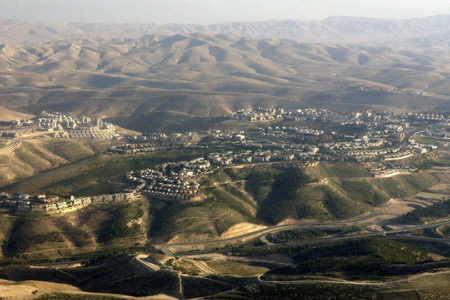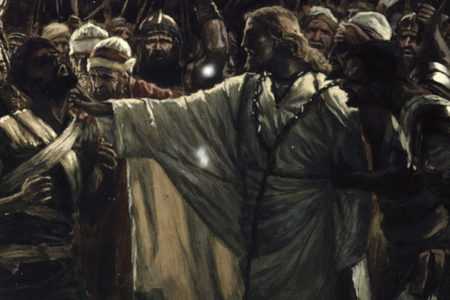God’s Anger and Wrath
The Bible reveals that God experiences anger and wrath. Many words, both in the Old and New Testaments, express this fact.
Old Testament Words
In the Hebrew text of the Old Testament, nouns for God’s wrath appear some 375 times.1
The word chemah refers to divine wrath at least 85 times.2 It seems to receive its meaning from a root term that means “be hot” or “be ardent.”3 Deuteronomy 29:23 declares that God overthrew Sodom, Gomorrah, Admah, and Zeboiim “in His anger and His wrath.”
The word aph has the basic meaning “snort” and the related meaning “nose.” Thus Psalm 18:7–8 says, because God was “angry,” “smoke went up from His nostrils.”4
The verb qasap and its related noun, qesep, involve “dismay, indignation, and resentment, as well as wrath and anger.”5 The noun refers to God’s “indignation, emotionally more or less explosive and often destructive.”6 Isaiah 34:2 states, “For the indignation of the Lᴏʀᴅ is against all nations, and His fury against all their armies; He has utterly destroyed them, He has given them over to the slaughter.”
The verb chara means “burn” and appears to be more intense than the verb qasap. Its counterpart noun, charon, means “anger” or “burning anger.”7 Because the Israelites made an idol to worship, “the Lᴏʀᴅ said to Moses, ‘I have seen this people, and indeed it is a stiff–necked people! Now therefore, let Me alone, that My wrath may burn hot against them and I may consume them’” (Ex. 32:9–10).
The verb form of the noun zaam could mean either “curse” or “be angry.”8 The noun is related to the concept of “blazing fire.”9 The 21 times that the noun is related to God, it “almost always appears as a term for the blazing wrath of Yahweh.”10 It is frequently translated “indignation.” Thus Psalm 78:49 declares that, when God dealt with Egypt, “He cast on them the fierceness of His anger, wrath, indignation, and trouble, by sending angels of destruction among them.”
The word rogez usually means “disturbance” and less frequently means “anger.”11 Seven passages relate rogez to God’s revelation of power. For example, Isaiah 23:11 asserts that God “shook the kingdoms.”12
Thirty times in the Old Testament the noun ebra means “anger, wrath,” or “expression of wrath”; and five times the verb abar means “be angered.”13 In most instances, the noun and verb “refer to divine wrath.”14 Isaiah 9:19 states, “Through the wrath of the Lᴏʀᴅ of hosts the land is burned up, and the people shall be as fuel for the fire; no man shall spare his brother.” Both words are often “combined with other words referring to anger.”15
New Testament Words
In contrast with the Hebrew Old Testament, the Greek New Testament has only two words for God’s anger or wrath: orge and thumos.
Orge refers to God’s wrath 22 times. For example, Romans 1:18 declares, “For the wrath of God is revealed from heaven against all ungodliness and unrighteousness of men, who suppress the truth in unrighteousness.”
Thumos refers to God’s wrath 10 times. One reference is in Revelation 15:7: “Then one of the four living creatures gave to the seven angels seven golden bowls full of the wrath of God who lives forever and ever.”
Language scholar Friedrich Buchsel claimed there is “no material difference” between these two words.16 W. E. Vine, however, said the following regarding thumos:
[It] is to be distinguished from orge in that thumos indicates more agitated feelings, an outburst of wrath from inward indignation, while orge suggests a more settled or abiding condition of mind, frequently with a view to taking revenge. Orge is less sudden in its rise than thumos, but more lasting in its nature. Thumos expresses more the inward feeling, orge the more active emotion. Thumos may issue in revenge, though it does not necessarily include it. It is characteristic that it quickly blazes up and quickly subsides, though that is not necessarily implied in each case.17
Expressions of God’s Wrath
The Bible uses some terms as figurative expressions of the nature of God’s anger and wrath but also as literal expressions of ways God’s wrath is administered.
Fire. God’s anger is “kindled” (Ps. 78:21). Smoke is in His nose, and fire burns there “all the day” (Isa. 65:5). God’s name is “burning with His anger,” and His tongue is “like a devouring fire” (30:27). His wrath incinerates (9:19). He blows against targets “with the fire” of His wrath (Ezek. 21:31), and His breath is “like a stream of brimstone” (Isa. 30:33).
God used literal fire to consume 250 men who presumed to take upon themselves functions restricted exclusively to the Aaronic priesthood (Num. 16:35). God will use fire and brimstone to destroy the forces of Gog and his allies when they invade Israel in the future (Ezek. 38:21–22).
Storm. Isaiah 30:30 associates the indignation of God’s anger with “tempest, and hailstones.” Jeremiah 30:23–24 states, “Behold, the whirlwind of the Lᴏʀᴅ goes forth with fury, a continuing whirlwind; it will fall violently on the head of the wicked. The fierce anger of the Lᴏʀᴅ will not return until He has done it, and until He has performed the intents of His heart.”
In the days of Noah God literally caused an unparalleled storm of rain for 40 days and nights in order to destroy the wicked people of the earth (Gen. 7:4).
Pouring. Because the rulers of Judah were evil, God declared, “I will pour out My wrath on them like water” (Hos. 5:10). After asking who can endure the fierceness of God’s anger, Nahum asserted, “His fury is poured out like fire” (Nah. 1:6).
In the future, seven angels will be given “seven golden bowls full of the wrath of God who lives forever and ever”; and a loud voice from the heavenly Temple will tell the angels, “Go and pour out the bowls of the wrath of God on the earth” (Rev. 15:7; 16:1).
Drinking. The Bible uses the metaphor of people, cities, and nations being forced to drink God’s wrath. Job referred to a person drinking “of the wrath of the Almighty” (Job 21:20). Psalm 75:8 states, “in the hand of the Lᴏʀᴅ there is a cup, and the wine is red; it is fully mixed, and He pours it out; surely its dregs shall all the wicked of the earth drain and drink down.” God commanded the prophet Jeremiah, “Take this wine cup of fury from My hand, and cause all the nations, to whom I send you, to drink it” (Jer. 25:15). Drinking was “to make them a desolation, an astonishment, a hissing, and a curse” (v. 18).
Isaiah 51:17 declared that Jerusalem had “drunk at the hand of the Lᴏʀᴅ the cup of His fury; you have drunk the dregs of the cup of trembling, and drained it out.” The consequence of the city drinking God’s wrath was “desolation and destruction, famine and sword” (v. 19; see also v. 22).
In Revelation 14:9–10 an angel shouted, ”If anyone worships the beast and his image, and receives his mark on his forehead or on his hand, he himself shall also drink of the wine of the wrath of God, which is poured out full strength into the cup of His indignation.”
In the future, the great city Babylon will be remembered before God “to give her the cup of the wine of the fierceness of His wrath” (16:19). “All the nations” will “have drunk of the wine of the wrath of” that great city’s “fornication” (18:3; cf. 19:15).
Winepress of Wrath. In the future an angel will “thrust his sickle into the earth” and gather “the vine of the earth,” and throw it “into the great winepress of the wrath of God” (Rev. 14:19). The winepress will be “trampled outside the city,” and blood will come from it “up to the horses’ bridles, for one thousand six hundred furlongs [200 miles]” (v. 20). When Jesus Christ will come from heaven in His Second Coming, He Himself will crush Satan and his rule of the world system by treading “the winepress of the fierceness and wrath of Almighty God” (19:15).
A Rod. As Jeremiah witnessed the Babylonian destruction of Jerusalem, he lamented, “I am the man who has seen affliction by the rod of His wrath” (Lam. 3:1).
Casting. Concerning the plagues that God inflicted on Egypt, the psalmist stated, “He cast on them the fierceness of His anger, wrath, indignation, and trouble, by sending angels of destruction” (Ps. 78:49).
Marching. God “marched through the land in indignation” (Hab. 3:12).
ENDNOTES
- Johannes Fichtner, “orge,” Theological Dictionary of the New Testament (hereafter cited as TDNT), ed. Gerhard Friedrich, trans./ed. Geoffrey W. Bromiley, translated from Theologisches Worterbuch zum Neuen Testament (Grand Rapids, MI: Eerdmans,1967), 5:395.
- D. Schunck, ”chemah,” Theological Dictionary of the Old Testament (hereafter cited as TDOT), ed. G. Johannes Botterweck and Helmer Ringgren, trans. David E. Green, translated from Theologisches Worterbuch zum Alten Testament (Grand Rapids, MI: Eerdmans, 1980), 4:464.
- Ibid., 462.
- Oskar Grether, Johannes Fichtner, “orge,” TDNT, 5:391.
- V. Reiterer, “qasap, qesep,“ TDOT, ed. G. Johannes Botterweck, Helmer Ringgren, and Heinz-Josef Fabry, trans. David E. Green, translated from Theologisches Worterbuch zum Alten Testament (Grand Rapids, MI: Eerdmans, 2004), 13:89.
- Ibid., 90.
- N. Freedman, J. R. Lundbom, “chara, charon,” TDOT, ed. G. Johannes Botterweck and Helmer Ringgren, trans. David E. Green, translated from Theologisches Worterbuch zum Alten Testament (Grand Rapids, MI: Eerdmans, 1986), 5:171–172.
- Wiklander, “zaam,” TDOT, 4:108.
- Ibid., 110.
- Ibid., 109.
- Vanoni, “rogez,” TDOT, 8:306.
- Ibid., 308.
- D. Schunck, “ebra, abar,” TDOT, ed. G. Johannes Botterweck, Helmer Ringgren, and Heinz-Josef Fabry, trans. Douglas W. Stott, translated from Theologisches Worterbuch zum Alten Testament (Grand Rapids, MI: Eerdmans, 1999), 10:426.
- Ibid., 428.
- Ibid.
- Friedrich Buchsel, “thumos,” TDNT, Gerhard Kittel, trans./ed. Geoffrey W. Bromiley, translated from Theologisches Worterbuch zum Neuen Testament (Grand Rapids: Eerdmans, 1965), 3:167.
- W. E. Vine, An Expository Dictionary of New Testament Words (Old Tappan, NJ: Revell, 1966), 55–56.







I struggled through so much, that I keep study of my Bible to help me. All the sad abuse from family, living alone mostly. Lost alot, no friends and widowed today after 5 marriages. Grown kids turn away when I was there support growing up. Just pray that soon God will lift me up, I am broken down to realize past work has pained me. Money may be lost, robbed, and why care to share passion while they never listen or help when needed to? Live truthly while the torture of condemnation of who I am. They want confusion with drugging innocent children for the wicked to rule. When does justice come, after we leave earth, and into our spiritual bodies? I pray my enemies repent of the wrongs they keep doing. Blessed to now have a home and they want me destroyed to not have anything. I keep searching for a job for support and hope I can get back up on good standing, with Gods help, will for the days I may have left to survive. End times, wicked will be punished to Gods plans.
My prayers are with you♡. For years I have tried to reach my father and family only to find out that an evil person who only saw money as a way of life and not, the Love of God, had been blocking me from doing so. I know how you feel, you are in my prayers 💚 Kimberly Anderson Acree